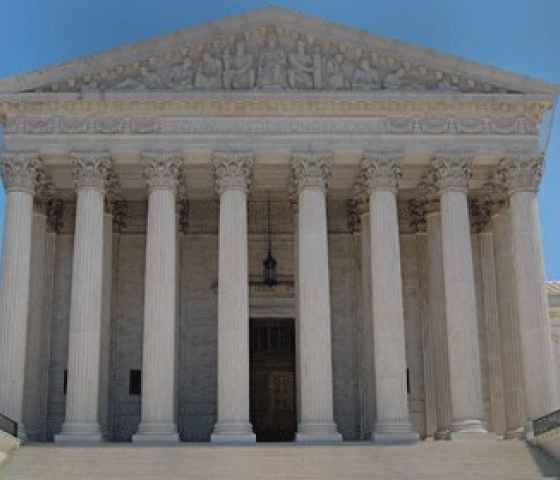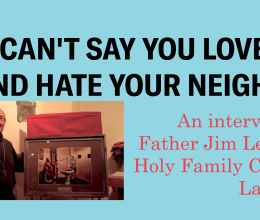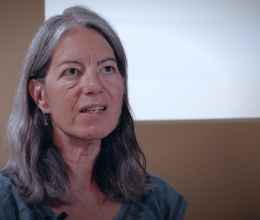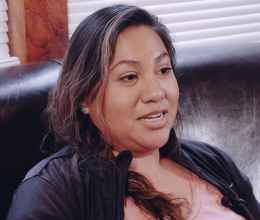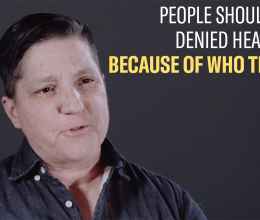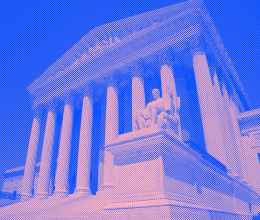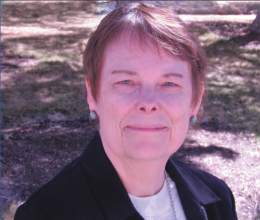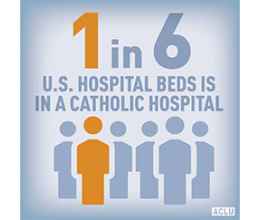Faith anchored the Rev. Martin Luther King Jr.’s tireless fight for legal equality for African Americans. His activism and his sermons helped deliver a deathblow to the then popular notion, espoused by segregationists of the day, that Jim Crow laws were divine mandate. Scores of faith leaders, whose religious beliefs also inspired them to take action, joined the Rev. King in his quest for equality and social justice.
50 years after the Rev. King’s death, the country is experiencing a resurgence in religious-based attacks on equality. The Trump administration has introduced policies aimed at making it easier for employers and universities to deny women birth control, for federal contractors to discriminate against LGBTQ people, and for hospitals to deny people essential healthcare, all under the guise of religious liberty. And states across the country are introducing similar bills, in an attempt to override local non-discrimination laws.
We sat down with the Rev. Liz McMaster, a retired Unitarian Universalist minister, who not only recognizes that religious freedom does not mean the right to discriminate against or harm others, but who draws upon her faith to promote social justice.
The Torch: Tell us about how you became a minister.
The Rev. Liz McMaster: I became involved in the Unitarian Universalist church in the South shortly after I got married. I liked that the Unitarians said, “God gave us a brain and let’s use it.” And they merged in 1965 with the Universalists whose belief is “God is love.” And I thought, “Okay, you put the mind and the heart together and that’s a great combination.”
At the same time, I became involved in the civil rights movement. To me, they were one in the same. I did work with the Southern Christian Leadership Conference and was blessed to meet Dr. King. I actually sat at his house during his funeral and then worked for Mrs. King, Coretta King, for 6 months, sorting messages of sympathy and grief for her and for her family that came in from all over the world alongside other volunteers.
Then I went to Harvard Divinity School and started ministry when I was 60 years old. From there, I helped start a church outside of Charlotte, North Carolina and after three years I went to Florida, where I stayed for six years. A colleague of mine suggested that maybe I would like interim ministry and then I started doing one and two year stints in a variety of places. I was in Los Alamos, Roanoke, Philadelphia, and Colorado Springs and it was a wonderful experience. I did that for 15 years and then I ran out of steam at 75.
The Torch: Over the last two years, the Trump administration has taken a number of measures aimed at making it easier for individuals and institutions to deny healthcare and services to women and LGBTQ people, with the supposed goal of promoting religious liberty. What does religious liberty mean to you?
The Rev. Liz McMaster: Well, it basically means for me to follow my God and for me to do what I think is right determined by my religious beliefs. I think it’s wrong that people say in the name of their religion that it’s okay to curtail somebody else’s freedom. It seems to me to be a very, very narrow view of what their God is and what their religion is.
The Torch: At what point does religious liberty morph into religious imposition or discrimination?
The Rev. Liz McMaster: When it infringes on somebody else’s freedom. I believe that everybody has a right to follow their own religious beliefs, with the stipulation that those beliefs don’t impugn on somebody else in a harmful, hurtful way.
The Torch: You volunteer your time to make it easier for women to make the reproductive healthcare choices that are right for them and their families without interference from the government or from anyone who might object to abortion on religious grounds. Why?
The Rev. Liz McMaster: I’m old enough to have known people who were of reproductive age before Roe v. Wade who struggled. I knew of women who died over botched abortions and self-induced abortions. That shouldn’t happen. We talk on one hand about freedom and then on the other hand we restrict people from living out their lives as they see fit. It seems very wrong to me.
The Torch: So what exactly do you do?
The Rev. Liz McMaster: I am involved in the Religious Coalition for Reproductive Choice here in Albuquerque. I drive women to get abortion care. I know that there are many people of good faith that believe abortion is not such a good idea, but then again, that’s infringing upon somebody else’s needs and beliefs. These women are not impugning on anybody else’s freedom. I don’t ask them why they are seeking abortion care because I think that’s an invasion of their privacy, but some of them tell me what their lives are like, and many of them are experiencing great difficulties. I drove a woman who was a senior at a major university. She and her boyfriend planned to get married, but they wanted to finish their education first. And it was very difficult for her. First, making the decision and then going through the rigmarole with the state that she lived in not helping her in any way. Fortunately, she found us and was able to do what she thought was right for her life and her partner’s life.
The Torch: Does your faith play a role in your decision to help these women?
The Rev Liz. McMaster: Absolutely. My faith is involved in pretty much everything I do. Unitarian Universalists have seven principles that guide their lives. The first principle is that we try to promote the inherent dignity and worth of every person. For me, promoting the inherent dignity and worth of women means doing everything I can to make sure they are able to carry out the choices that they’ve determined are right for them and their families. Placing barriers between women and their reproductive freedom not only undercuts their dignity and autonomy, it puts their lives at risk.
The Torch: Your faith welcomes lesbian, gay, bisexual, queer, transgender and gender nonconforming people. Is that right?
The Rev Liz. McMaster: It’s not just an acceptance — it’s a real desire for that diversity because it makes a faith stronger. If all I do is surround myself with people who are just like me, than I haven’t grown at all. The role of religion is strengthening of belief as well as a teaching role.
The Torch: As a faith leader, why is it important to you that LGBTQ people be free from religious-based discrimination?
The Rev Liz. McMaster: I have a daughter who is a lesbian and she came out to me in her early twenties when she wasn’t sure who she was herself. It was difficult for her and my answer to her was, “I want you to be happy with whomever you find happiness with.” And she said, “Oh, but mom you want me to have grandchildren.” And I said, “I think that’s way secondary to you finding who you are and who you’re going to spend your life with.” And actually she did give me a grandchild so I got that too.
The Torch: Does it bother you when you see politicians and religious leaders, many of whom identify as Christian, calling for religious exemptions to non-discrimination laws?
The Rev Liz. McMaster: Yeah. We need to understand what Jesus’ life was all about. I mean, Jesus was not only a really warm, loving human being, he was also a systems change person and he died trying to change the systems under which his people were living. I think there is something wrong in Washington, and we have a responsibility to change it.
Originally published in the winter 2018 edition of The Torch.
